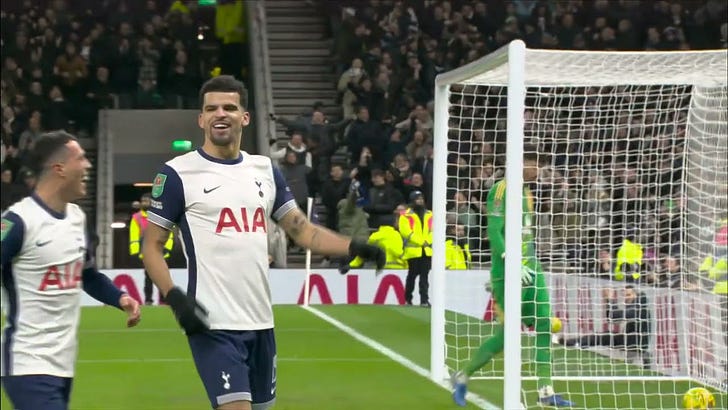How not to manage a cup tie
Ruben Amorim came down to earth after the derby – and paid a price for his own handling of Rashford and Garnacho
SIX ASIDES Carabao Cup, QF: Spurs 4, United 3
This game should have finished 4-3 to United, just like their previous quarter-final, against Liverpool. Now, as then, the cup atmosphere made for entertaining bedlam. In both games United had 20 shots. In both they were behind for ages. In both Amad came on as a sub and scored a goal. And in both they showed fighting spirit. They could have done with Marcus Rashford, who led the line against Liverpool and produced a crisp finish to make it 3-3, the scoreline that never quite materialised here.
Spurs, like City at the weekend, were there for the taking. In their past four home games they had drawn two and lost two. At centre-back they had Archie Gray, a slip of an 18-year-old who usually goes at right-back or in midfield. Their high line makes them susceptible to pace even when they have their first-choice back four. So what did Amorim do? He picked two defenders at wing-back, again (Noussair Mazraoui, a round peg in a square hole, conceded several cheap fouls and gave the ball away for the fourth goal.) Amorim rested Amad, a man in the form of his life, and replaced him with Antony, a man who can barely remember what form feels like. He dropped Harry Maguire, just when he’d got back in the groove, even though United faced an obvious danger-man in Dominic Solanke. He left Rashford in the wilderness and put Alejandro Garnacho on the bench, forcing himself to play Antony as one of the two No 10s for the first time and to have little pace in either of those slots. And then he told us that his selection was just ‘what is best for the team’.
Amorim did at least bring Christian Eriksen back from the cold (where he should never have been in the first place). But he blundered by picking Altay Bayindir, who was beaten at his near post not once, not twice, but three times, and then flapped ineffectually at the corner that clinched it for Spurs. Bayindir has barely ever faced Premier League opponents before. He should have been third choice for this game, behind André Onana and even Tom Heaton, who, in the absence of Maguire and Matthijs de Ligt, would have bossed the defence at set pieces – and would not have let that corner have the last word.
In 55 minutes with Antony on the field, United lost 3-0; in about 40 with Amad, they won 3-1. Amad is in such red-hot form that he’s now scoring with his backside. But there was just too much to do by the time he came on. United conceded first for the fifth game running, a sequence that began at Arsenal. In four of those five games, all away from home, Amorim has picked a pair of full-backs at wing-back. It half-worked at Arsenal, where United didn’t concede until the experiment had been abandoned – but only because they parked the bus.
Amorim has criticised Rashford for talking to the media rather than to him. But it was he, Amorim, who chose to air their dirty linen in the first place. Like Erik ten Hag with Jadon Sancho, he bad-mouthed one of his players in public. You can’t do that and then claim the moral high ground. Rashford’s response, unlike Sancho’s, was measured, with no criticism of the club or the manager. Amorim had aligned himself with the boo-boys who attacked Rashford at Plzen, a decision he may come to regret. Those fans, or similar ones, unfurled a banner at Tottenham saying ‘Excuses, ta ra Marcus’. That’s not supporting your club: it’s attempted bullying. If you’re going to bash Rashford for his poor season in 2023-24, you have to praise him too, for a sensational one in 2022-23 and two very good ones in 2019-20 and 2020-21. If you’re going to talk about excuses, you have to acknowledge that he has often played through the pain. To be fair, that’s a lot to get on a banner, but it shows that a banner isn’t the right medium for a nuanced situation.
The haters (and some writers) keep behaving as if Rashford was still in his slump. Far from it: if you look at his goal involvements per 90 minutes in all competitions (excluding penalties), his figure for this season is 0.60, whereas last season it was 0.33. The season before it was 0.80, so where he is now is closer to his peak than to his nadir. He has seven goals this season from just 2.7 xG, the healthiest ratio of any United player. He was well on the road to recovery – until the manager let his tyres down.
Tim de Lisle is the editor of United Writing and a sportswriter for The Guardian. If you’re on Bluesky, do follow him.


